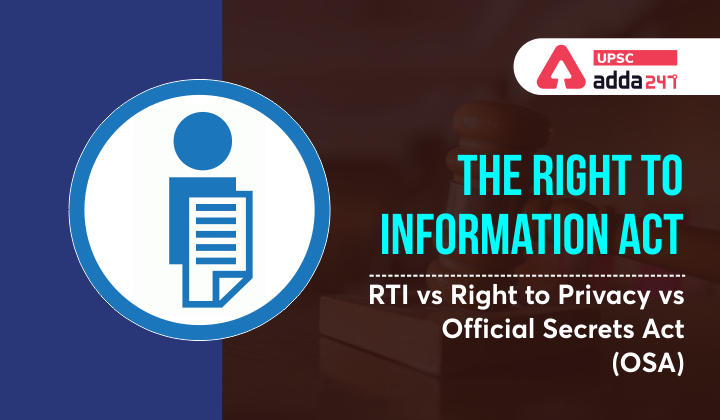Table of Contents
The Right to Information Act- Relevance for UPSC Exam
- GS Paper 2: Important aspects of governance– Citizens charters, transparency & accountability and institutional and other measures.
The Right to Information Act
- The Right to Information Act is a revolutionary Act that aims to promote transparency in government institutions in India.
- The Right to Information Act came into existence in 2005, after sustained efforts of anti-corruption activists.
- We have already discussed the key concept of-
- Right to Information Act, historical background and its objectives,
- Key Provisions of the RTI Act
- Applicability of RTI Act and
- Recent Amendments and Time Period for Providing Information
- Exempted Entities and Information from RTI and Conflict with Non-Disclosure Legislations
- Associated Challenges and Significance of the RTI Act
- In this article, we are going to discuss the trade-off between RTI Act and the Right to Privacy & Official Secrets Act (OSA).
Fill this form to get free Study Material of UPSC ESIC Deputy Director
The Right to Information vs Right to Privacy
- In modern times when technological information breach is very common, the right to privacy and the right to information are both essential human rights.
- Complementarity: both complement each other in holding governments accountable to individuals in a majority of the cases.
- Conflicting areas: while RTI increases access to information, the right to privacy protects it instead.
- When the question of harmonizing the contradicting rights arises, it should-
- give justice to the larger public interest
- advance the public morality
The Right to Information Act- Associated Challenges and Significance of the RTI Act
The Right to Information vs Official Secrets Act (OSA)
- Background of OSA: It was enacted in 1923 by the British to keep certain kinds of information confidential, including, but not always limited to, information involving the affairs of state, diplomacy, national security, espionage, and other state secrets.
- In case of conflict between RTI and OSA: Provisions of the RTI Act override those of the OSA.
- Section 22 of the RTI Act: It states that its provisions will have effect notwithstanding anything that is inconsistent with them in the OSA.
- Section 8(2) of the RTI Act: a public authority may allow access to the information covered under the OSA, “if the public interest in disclosure outweighs the harm to the protected interest”.




 TSPSC Group 1 Question Paper 2024, Downl...
TSPSC Group 1 Question Paper 2024, Downl...
 TSPSC Group 1 Answer key 2024 Out, Downl...
TSPSC Group 1 Answer key 2024 Out, Downl...
 UPSC Prelims 2024 Question Paper, Downlo...
UPSC Prelims 2024 Question Paper, Downlo...




